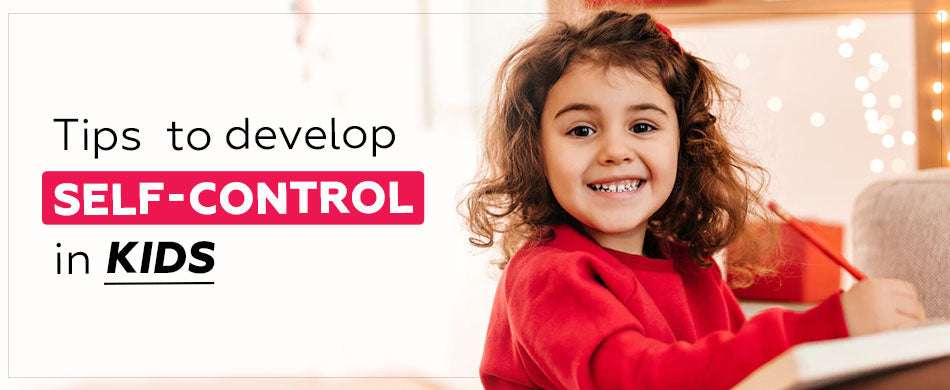
Simple Tips To Build Self-Control In Preschoolers
- by Baby Organo
- 2 min 8 sec
Table of Contents
Self-control is an essential life skill for all, irrespective of age. However, it takes time to develop self-control in kids, but it is greatly beneficial to teach self-control at an early age. Self-control is the ability to pause and think before taking action to complete a task or react to it.
It is the process of managing your thoughts, actions, and emotions. We may often witness kids becoming aggressive, impatient, or show uncontrollable actions when they lose control. Children with self-control skills are likely to be more successful, stable, and happy.
It is common for kids to lose their self-control in a blink, which is fine because it happens with every child in their growing period. Developing self-control in preschoolers is challenging, but their brain enormously develops during that phase. But, a part of the brain known as the prefrontal cortex controls executive functions, including the ability to focus and self-regulate functions gradually.
However, the good news is that even preschoolers can develop self-control with the help of these techniques. Let's dig deeper.
Techniques to develop Self-Control in Kids
Play games that encourage self-controlling skills
Self-control is a need more than a skill. But, it requires skills to implement self-control in kids, and playing games that encourage self-control is the best technique to teach self-control. Many games include Red Light, Green Light, Freeze Dance, Follow My Clap, and Simon Says. These games demand the child's attention, and they must listen carefully to follow the instructions and patterns to play the game. Moreover, engage your child in physical activities as it keeps them mentally and physically healthy and helps to develop self-control.
Set routines
Establishing a routine for children is crucial. If a kid eats or sleeps less than they should, it disturbs their functioning and may develop temperamental issues. Hence, create a fixed schedule for your child each day, so they know when it's the time to eat, sleep and play. A fixed routine makes the child less distracted from other distractions.
Give choices and substitutes
Sometimes kids might be frustrated and throw tantrums, and one of the reasons can be a lack of choices. Parents should provide choices to their children because a child gets bored easily by repeating the same task. So, ensure to give your child enough choices which keep them in control. Also, it's equally significant to offer a substitute to your kid. If your child demands to play with the smartphone, ensure you get them a toy phone or replace their demand by offering the child his other favorite activity. This keeps a kid open to other substitutes and helps to cope with disappointments.
Praise good behavior
Praising your child for their good behavior always works wonders. So, whenever your kid waits for his turn in a queue or does any activities that require them to show self-control. Never miss an opportunity to praise your child and tell them they did a good job. These words of appreciation help a child to stick to that good behavior without giving a reminder.
Be a good example
Children may not learn what you teach but quickly grasp what you do. Kids are keen observers; they see how you behave and react to situations that demand your self-control. If you lose your cool and portray aggressive behavior, a child thinks it is acceptable to behave. Hence, parents must be wise and calm and demonstrate how to manage impulsive behavior. If you're angry at the moment, tell your kids, ' I am feeling angry, and I need to be alone for some time to let cool off. Teaching such practices is very effective for kids.
Keep the distractions away
Anything that's out of sight stays out of mind. Parents must create an environment that helps children stick to self-control practices. The clear idea is to put away the stuff that distracts your kid. If your toddler gets possessive about his favorite toy during a playdate which creates conflict, then ensure to keep that toy out of his sight. Keep the temptations away to encourage self-control in kids in the initial phase.
Empathize with your kid
There are times when your child may lose control and burst into tears. During that moment, it would be inappropriate or useless to say words such as 'stop crying' or 'there's no reason to be sad because it won't work to manage your child's emotions. Instead, it is advisable to empathize with them and talk about what makes them feel sad. When a child is crying, he doesn't need instructions, but he needs your support and understanding.
It can be challenging to develop self-control in kids, but your child can learn self-control if you're emotionally available for them at each moment. Do not lose your patience and stick to the process. Above all, do not overwhelm your child in the process of teaching self-control. It is their golden period of life to learn and explore the world so let your child breathe and take some break. It is fine to give your kid a friendly reminder to follow the process of self-control but not at the cost of their freedom.
- Tags:
- Parenting tips


